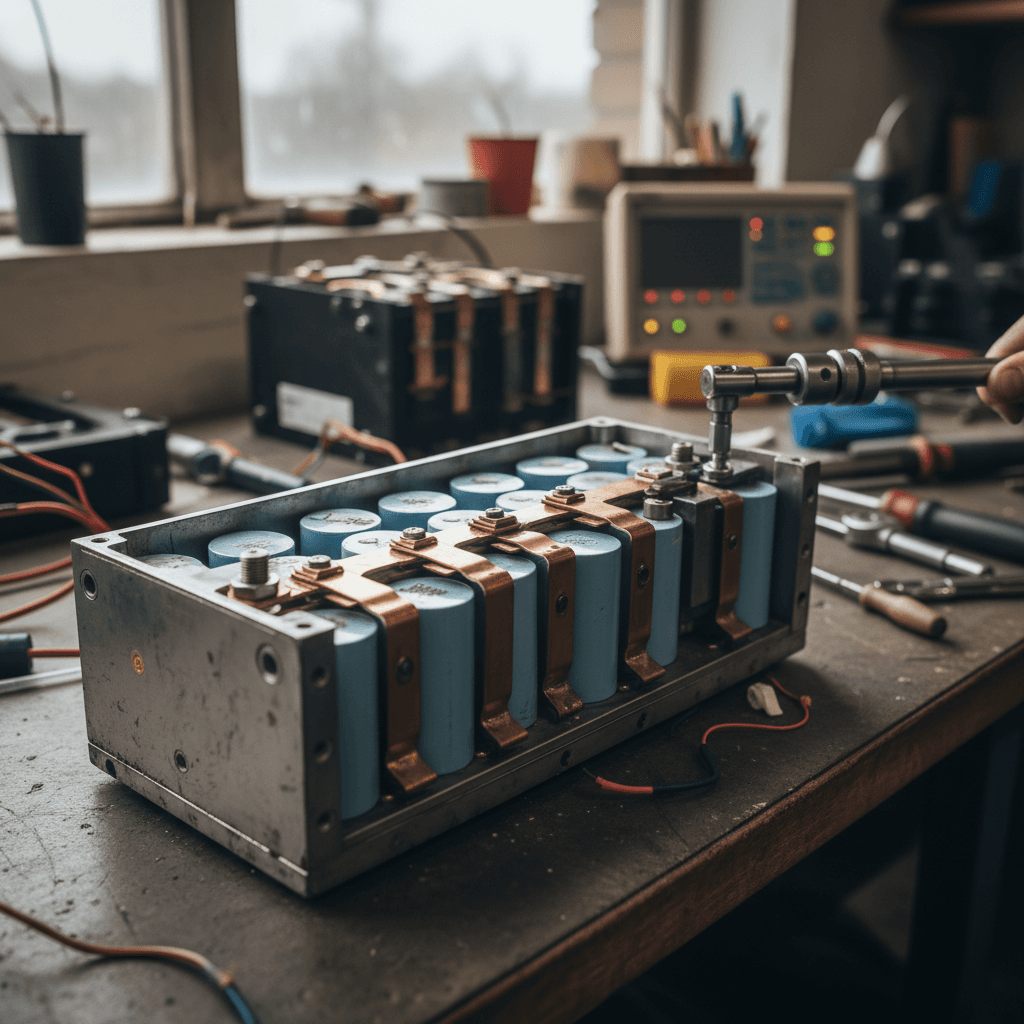If you’re typing “rebuilt batteries near me” into a search bar, you’re probably staring down one of two realities: a scary EV repair estimate or the fear of buying a used electric car with a tired pack. Before you throw five figures at a high‑voltage mystery box, it’s worth understanding how rebuilt EV batteries really work, and where they fit into a smart ownership strategy.
Quick take
What people really mean by “rebuilt batteries near me”
“Rebuilt batteries near me” is a catch‑all phrase. In EV land, it can mean at least four different things, and each has very different implications for cost, safety, and resale value:
- Module-level repair – One or a few weak modules in your pack are replaced with used or reconditioned ones. The rest of the pack stays original.
- Remanufactured pack – A specialist tears down a used pack, replaces failed modules, balances the rest, and sells it as a reconditioned battery with a limited warranty.
- Used salvage pack – A battery pulled from a wrecked EV, usually tested and maybe lightly serviced, but not fully rebuilt.
- Cell or BMS repair – In rare cases, shops repair damage to the battery management system (BMS), wiring, or cooling rather than replacing modules.
Not all “rebuilt” is created equal
How rebuilt and remanufactured EV batteries actually work
Modern EV packs are Lego towers of smaller modules and cells. When a pack fails or loses too much capacity, it’s often because a few modules have drifted out of line rather than the entire pack catastrophically collapsing. That’s the opening for the rebuilt‑battery industry.
Step-by-step: typical remanufacturing process
- Shop acquires a failed or salvage pack.
- Pack is opened, modules are removed and individually tested.
- Weak or failed modules are replaced with matched, used modules.
- Cells are balanced so voltages and capacities line up.
- Cooling plates, seals, and busbars are inspected and replaced as needed.
- Pack is reassembled, pressure‑tested, and run through a diagnostic cycle.
What can go wrong
- Poor matching: replacement modules don’t age at the same rate as the rest.
- Insufficient testing: hidden cell damage shows up months later.
- Thermal issues: old coolant plates or seals lead to hot spots.
- Software quirks: some OEMs don’t love non‑factory packs; fault codes can persist.
This is why the quality of the rebuilder matters more than the buzzword “rebuilt.”
Think of it like an engine rebuild

Rebuilt vs new EV battery costs in 2025
Here’s the uncomfortable bit: EV battery replacement is still expensive, whether you go new or rebuilt. But the spread between those options is exactly why you’re searching for rebuilt packs in the first place.
EV battery economics in 2025
Typical 2025 costs: new vs rebuilt EV batteries
Approximate ranges for popular EV categories in the U.S. Your exact numbers will depend on brand, pack size, and whether you’re near a specialist rebuilder.
| Vehicle type | New OEM pack | Rebuilt / remanufactured | Notes |
|---|---|---|---|
| Compact EV (Leaf, Bolt, etc.) | $5,000–$8,000 | $3,000–$5,500 | Older Leaf packs are common donors for rebuilders. |
| Mainstream sedan/SUV (Model 3, Ioniq 5, etc.) | $8,000–$15,000 | $5,000–$9,000 | Rebuilt availability varies widely by brand. |
| Luxury / long-range (Model S, Lucid, etc.) | $12,000–$20,000+ | $8,000–$14,000 | Higher labor and transport costs due to pack size. |
Labor can add another $1,000–$3,000 for either option.
Shipping can erase your savings
Safety and warranty risks with rebuilt batteries
This is the part the glossy ads tend to skip. EV packs are not just big phone batteries; they’re high‑voltage, actively cooled, software‑controlled devices living in the crash structure of the car. Cutting corners here can have real consequences.
- Warranty conflicts – Most automakers will not honor high‑voltage battery warranties once a pack has been opened or modified by a third party.
- Fire and thermal risk – A pack with mismatched modules, damaged cooling plates, or contaminated seals can develop hot spots. That’s not theoretical; improperly repaired packs have been implicated in thermal events.
- Crash safety – The battery is part of the car’s structure. A poorly resealed pack can be more vulnerable in a collision or flood.
- Software limbo – Some cars may limit power or show errors if they detect a non‑standard pack configuration. In extreme cases, the car can brick itself until a dealer reprograms it, if they’re willing to touch a modified pack at all.
- Resale hit – Future buyers (and lenders) may hesitate when they see “rebuilt battery” with no recognized brand or documentation.
Never treat a high‑voltage pack like a junkyard alternator
Where to actually find rebuilt EV batteries near you
If you decide a rebuilt pack is worth exploring, you won’t usually find it at the corner oil‑change chain. This is still a specialist world. Here’s where to look and what to ask.
Main sources for rebuilt EV batteries
Start local when you can, shipping big packs gets expensive quickly.
EV-specialist independent shops
Look for independent repair shops that advertise EV battery diagnostics, not just "hybrid service." Many can replace modules or source remanufactured packs.
Ask for photos of previous EV battery jobs and references.
Regional remanufacturers
Some companies focus on specific models (for example, Leaf or Model S packs). They may ship rebuilt packs to local installers or run traveling service teams.
Dig into their testing process and warranty length.
Salvage and recycler networks
Large auto recyclers and battery recycling firms increasingly sell tested salvage packs or modules. These are more "used" than "rebuilt," but can be cost‑effective.
Make sure they provide voltage, capacity, and leak‑test data.
How to search smarter
When a rebuilt battery makes sense, and when it doesn’t
Rebuilt packs aren’t automatically sketchy. In the right context, they’re a rational, sustainable use of hardware that still has plenty of life. The trick is knowing when the math, and the risk, pencil out.
Situations where rebuilt can be reasonable
- Older, low‑value EV – Your car is worth $10,000 and a new pack quote is $12,000. A $4,500 rebuilt pack with a solid 2‑ to 3‑year warranty can keep it on the road without going upside‑down.
- Fleet or work use – You’re squeezing a few more years out of a delivery EV where resale value isn’t critical.
- Known failure pattern – Some early EVs have well‑understood module issues, and experienced rebuilders know exactly how to address them.
- Local, reputable rebuilder – You have access to a shop with strong reviews, clear processes, and written warranties.
When a rebuilt pack is a red flag
- Late‑model EV under or just out of warranty – You may be better off pursuing goodwill assistance from the manufacturer or a certified new pack.
- Safety‑critical or high‑performance use – Track days, heavy towing, extreme climates: these stress packs. A marginal rebuild is a bad companion.
- Vague or no paperwork – If the shop can’t show test results, donor mileage, or warranty terms, assume the answer is no.
- Plans to resell soon – Buyers and lenders tend to prefer OEM packs and documented battery health over aftermarket heroics.
A better alternative: buy a used EV with verified battery health
The simplest way to avoid the whole “rebuilt batteries near me” problem? Don’t buy a question mark in the first place. Instead of gambling on a car that might need a pack, choose a used EV with documented battery health and transparent pricing that already reflects the pack’s condition.
How Recharged approaches battery risk
Because Recharged specializes exclusively in EVs, the battery isn’t an afterthought, it’s the main act. If a pack’s health doesn’t justify the price, it doesn’t quietly become your problem five months later. The car is priced accordingly, or it doesn’t make the cut.
Checklist before you say yes to a rebuilt battery
10 questions to ask any rebuilder or shop
1. What exactly are you replacing?
Are they swapping individual modules, remanufacturing the entire pack, or installing a used salvage pack? Get a clear, written description.
2. Where do the donor parts come from?
Ask for donor vehicle mileage, age, and accident type. A pack from a light rear‑end collision is different from one pulled out of a flood car.
3. How do you test modules and the finished pack?
Look for voltage, capacity, and load testing, plus leak and insulation checks. “We scan it and it’s fine” is not enough.
4. What’s the warranty, terms and fine print?
You want length (years and miles), coverage (parts and labor), and exclusions in writing. Ask what happens if the pack loses range but doesn’t outright fail.
5. Are you insured for high-voltage work?
A serious shop will have specific coverage for EV and hybrid high‑voltage repairs. If they hesitate, that’s your cue to leave.
6. Will this affect my factory warranty?
If any portion of your EV battery warranty is still active, confirm, in writing, how this work interacts with it. Consider asking the OEM or dealer directly.
7. How many EV battery jobs have you done?
Experience matters. A shop that’s done three oil changes on plug‑in hybrids is not who you want rebuilding a 400‑V pack.
8. What’s the plan if something goes wrong?
If the pack throws errors or degrades quickly, do they repair, replace, or refund? Is transport included if the car becomes undriveable?
9. Can I see before/after data?
A professional rebuilder should be able to show you state‑of‑health (SoH) and capacity numbers before and after the work.
10. How will this impact resale?
Ask whether they provide documentation you can share with a future buyer or lender, not just a generic invoice.
FAQ: rebuilt EV batteries and used EV shopping
Frequently asked questions about rebuilt EV batteries
Bottom line on searching for “rebuilt batteries near me”
Hunting for “rebuilt batteries near me” is usually a symptom, not the root cause. The real issue is uncertainty: you don’t know what your current pack, or the pack in that tempting used EV, is going to cost you over the next few years. Rebuilt batteries can absolutely have a place in the ecosystem, especially for older, low‑value EVs kept in service by knowledgeable specialists. But they’re not a magic coupon for a brand‑new pack.
If you’re already sitting on a dead or degraded battery, use the checklist above, stay local when you can, and treat any shop that downplays risk as a warning sign. If you’re still shopping, the cleaner play is to start with the right car, one whose battery health is measured, priced into the deal, and backed by people who live and breathe EVs. That’s exactly the gap Recharged was built to fill.



